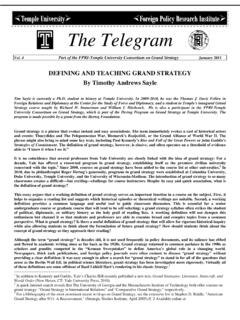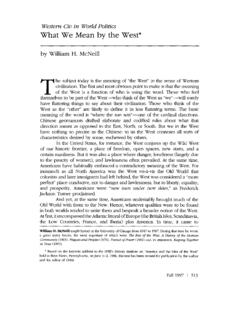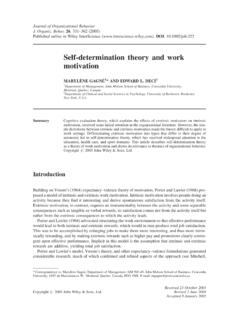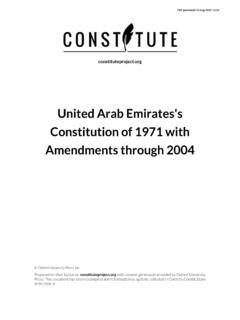Transcription of RUSSIAN PERCEPTIONS OF MILITARY AI, AUTOMATION, AND …
1 RUSSIAN PERCEPTIONS OF MILITARY AI, AUTOMATION, AND AUTONOMYANNA NADIBAIDZEEURASIA PROGRAMAll rights reserved. Printed in the United States of America. No part of this publication may be reproduced or transmitted in any form or by any means, electronic or mechanical, including photocopy, recording, or any information storage and retrieval system, without permission in writing from the publisher. The views expressed in this report are those of the author alone and do not necessarily reflect the position of the Foreign Policy Research Institute, a non-partisan organization that seeks to publish well-argued, policy-oriented articles on American foreign policy and national security : Anna NadibaidzeEditing: Indra Ekmanis, Chris MilerDesign: Natalia Kopytnik, Leah Pedro 2022 by the Foreign Policy Research Institute January 2022 ABOUT USThe Foreign Policy Research Institute (FPRI) is a non-partisan think tank based in Philadelphia. Its founding principle is that a nation must think before it acts.
2 FPRI is dedicated to producing the highest quality scholarship and nonpartisan policy analysis focused on crucial foreign policy and national security challenges facing the United States. We educate those who make and influence policy, as well as the public at large, through the lens of history, geography, and IDEASIn an increasingly polarized world, we pride ourselves on our tradition of nonpartisan scholarship. We count among our ranks over 100 affiliated scholars located throughout the nation and the world who appear regularly in national and international media, testify on Capitol Hill, and are consulted by government THE AMERICAN PUBLICFPRI was founded on the premise that an informed and educated citizenry is paramount for the to conduct a coherent foreign policy. Through in-depth research and extensive public programming, FPRI offers insights to help the public understand our volatile world. CHAMPIONING CIVIC LITERACYWe believe that a robust civic education is a national imperative.
3 FPRI aims to provide teachers with the tools they need in developing civic literacy, and works to enrich young people s understanding of the institutions and ideas that shape American political life and our role in the world. PERCEPTIONS OF MILITARY AI, AUTOMATION, AND autonomy ANNA NADIBAIDZECONTENTS INTRODUCTION2A NOTE ON CONCEPTS4 DOES RUSSIA WANT TO RULE THE WORLD THROUGH AI? 11 COMPARING PLANS AND CAPABILITIES24 RUSSIAN DEBATES ON AUTONOMOUS WEAPONS SYSTEMS 26 CONCLUSIONS28 FOREIGN POLICY RESEARCH INSTITUTE2 President Vladimir Putin declared 2021 to be the Year of Science and Technology in Russia, with November named as the month of artificial intelligence (AI), signaling RUSSIAN leadership s strong interest in this umbrella The RUSSIAN defense sector is particularly captivated by the opportunities associated with AI-based technologies. In recent years, AI, robotics, as well as the further integration of automation and autonomy into weapons systems and MILITARY decision-making have all been highlighted as priorities for modernizing the RUSSIAN armed 2017, Putin famously said that artificial intelligence is the future, not only for Russia, but for all humankind.
4 Whoever becomes the leader in this sphere will become the ruler of the world. 2 Quoting these words, analysts often attribute Russia s development, testing, and use of weaponized AI to the necessity of competing in the so-called global AI race or the global tech race with the current leading AI developers: the United States and 1 Ministry of Science and Higher Education of the RUSSIAN Federation, 2021 Is Announced as the Year of Science and Technology in Russia, , Evgeny Kalyukov, Putin Named the Conditions for the Emergence of the Future Ruler of the World, RBC, September 1, 2017, Dominik P. Jankowski, Russia and the Technological Race in an Era of Great Power Competition, Center for Strategic and Interna-tional Studies, September the perceived need to compete and catch up is part of Russia s motivations, its interest in MILITARY AI should not only be attributed to a quest for relative power. Understanding the depth and complexity of the debates surrounding AI, autonomy , and automation in Russia requires an examination of discussions about its strategic implications for the RUSSIAN army, the perceived benefits and risks of autonomy , and, more broadly, the importance of technological modernization and innovation for Russia s place in the world.
5 This report aims to provide an overview of the different conceptions and motivations, both oriented towards domestic and inter-national audiences, that have been and are guiding RUSSIAN political and MILITARY leader-ships in their ambitions to pursue weapon-ized AI. First, it outlines the various factors, both external and internal, behind the quest for pursuing AI, autonomy , and automation in the RUSSIAN MILITARY . Second, it presents some of the RUSSIAN plans in this area, what is known about their capabilities, and the challenges to strengthening them. Third, it dives into RUSSIAN debates on autonomy , and INTRODUCTION RUSSIAN PERCEPTIONS OF MILITARY AI, AUTOMATION, AND AUTONOMY3especially autonomous weapons systems, as well as discussions on the ethics of develop-ing so-called killer robots, or autonomous combat robots (боевые роботы, or военные роботы), a term often used in the RUSSIAN -lan-guage literature.
6 The analysis is based on a survey of open-source materials, including media reports, press releases, official statements and speeches, peer-reviewed articles and think tank reports, as well as publications in RUSSIAN MILITARY journals. The author would like to present it as the first step in an ongoing doctoral research project, as well as a contribution to the emerging English-language literature on how weaponized AI is perceived in Russia. Valery Falkov, Minister of Science and Higher Education of the RUSSIAN Federation, remarking on the Year of Science and Technology in December, 2021. (Source: )FOREIGN POLICY RESEARCH INSTITUTE4 This report analyzes conceptions of autonomy , automation, and AI three terms that are often confused with each other, both in Russia and abroad. It is worth starting by exploring these concepts. Automation is a way of delegating tasks to machines that is based on a specific sequence of actions or rules, making the process more predictable.
7 An automated system is one that acts according to a preprogrammed script for a task with defined entry/exit condition. 4 autonomy is a more complex process, and broadly means programming machines to perform some tasks or functions that would ordinarily be performed by humans, but without detailed rules, thus making it more AI can be defined as the ability of a digital computer or computer-controlled robot to perform tasks commonly associated with intelligent beings. 6 AI and its sub sets such as machine learning, as well as its applications such as computer vision, facial and sound recognition, can be used to achieve a higher level of automation and 4 M. L. Cummings, The Human Role in Autonomous Weapon Design and Deployment, in Lethal Autonomous Weapons: Re-Examin-ing the Law and Ethics of Robotic Warfare, ed. Jai Galliott, Duncan MacIntosh, and Jens David Ohlin (Oxford: Oxford University Press, 2021), Michael C.
8 Horowitz and Paul Scharre, Meaningful Human Control in Weapon Systems: A Primer, Center for a New American Secu-rity, 2015, 5, Copeland, Artificial Intelligence, in Encyclopedia Britannica, 2021, Christof Heyns, Human Rights and the Use of Autonomous Weapons Systems (AWS) During Domestic Law Enforcement, Human Rights Quarterly 38 (2016): United Nations Security Council, Final Report of the Panel of Experts on Libya Established Pursuant to Security Council Resolution 1973 (2011), March 8, 2021, 17, THE HELP OF ADVANCES IN AI, WEAPONS SYSTEMS CAN MOVE FURTHER ON THE SPECTRUM OF autonomy , HAVE MORE TASKS, AND EVENTUALLY REPLACE HUMANS ON THE in weapons systems. Autonomous weapons systems are usually defined as robotic weapons systems that, once activated, can select and engage targets without further intervention by a human operator. 7 A United Nations Security Council report published in March 2021 suggests that the Turkish-made Kargu-2 loitering munition system was programmed to select and attack targets in an autonomous mode during the Libyan Civil This was portrayed as the A NOTE ON CONCEPTSRUSSIAN PERCEPTIONS OF MILITARY AI, AUTOMATION, AND AUTONOMY5first use of a lethal killer robot by media around the world.
9 However, it remains unclear whether the system actually operated autonomously at the time of the attack. At the same time, capabilities between those areas are not always equal. In the RUSSIAN case, automation and the development of unmanned robotic systems are more advanced than integration of more modern machine learning-based systems. The automation (автоматизация) process, as it is often referred to in RUSSIAN MILITARY literature other terms include robotization (роботизация), intellectualization (интеллектуализация) 9 For more on automation vs. intellectualization, see Anya Fink, RUSSIAN Thinking on the Role of AI in Future Warfare, RUSSIAN Stud-ies Series 5/21, November 8, 2021, digitalization (дигитализация) is not a new Russia s capabilities in terms of automated and remotely controlled weapons systems are relatively better than its ability to integrate machine learning and other sub-elements of the broad technology under the AI umbrella term.
10 The position of many MILITARY policymakers and analysts is that, with the help of advances in AI, weapons systems can move further on the spectrum of autonomy , have more tasks, and eventually replace humans on the battlefield. Remotely controlled weaponsWeapons systems with automated and autonomous featuresFully autonomous weaponsFigure 1. SPECTRUM OF autonomy IN WEAPONS SYSTEMS Source: Ingvild Bode and Hendrik Huelss, Autonomous Weapons Systems and International Norms (Montreal: McGill-Queen s University Press, forthcoming 2022), chapter POLICY RESEARCH INSTITUTE6AI is often described as a technology with the potential to substantially transform the practices and norms of In its official discourse, RUSSIAN leadership presents AI in the same way. AI and its applications are portrayed as one of the key technologies of the 21st century, if not the most important one, with revolutionary impact for the future of defense and MILITARY strategy.










